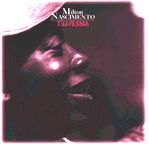 Milton Nascimento "Milton Nascimento" (A&M, 1967)
Milton Nascimento "Milton Nascimento" (A&M, 1967)


Great record. Though admittedly syrupy, this still rivals 1972's Clube de Esquina as one of his best. Produced and arranged by Luis Eca, this highlights Nascimento as an up-and-coming songwriter, and has the strongest, best pop sensibility of any of his albums. It also embraces jazz, but in more of a post-bossa loungey sense, and not his later space-rock or quiet storm-ish styles. Highly recommended. The album was re-released several times under the title Travessia -- look for it under that name if you want it on CD, and also as on CBS O Primeiro.
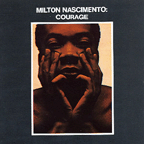 Milton Nascimento "Courage" (A&M/CTI, 1968)
Milton Nascimento "Courage" (A&M/CTI, 1968)


Yeesh. A torpid, jazz-scented morass of trebling, shimmery keyboards and languid string arrangements -- Nascimento is doing straight pop ballads, more or less, but the musical direction by Eumir Deodato is... so... sluggish... and... syrupy... and... overwrought... that it really gets in the way. Still, fans may be intrigued by this relatively "normal" record from early in his career, which hints at his tweakier leanings.
Milton Nascimento "Milton Nascimento" (EMI Odeon, 1969)
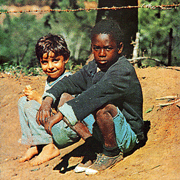 Milton Nascimento & Lo Borges "Clube Da Esquina" (EMI Odeon, 1972)
Milton Nascimento & Lo Borges "Clube Da Esquina" (EMI Odeon, 1972)


(Produced by Milton Miranda, Lindolfo Gaya & Milton Miranda)
Nascimento's masterpiece. An expansive, kaleidoscopic 2-LP set covering an amazingly wide range of styles, from folky space rock-tropicalia, to various regional Brazilian styles and rich traces of jazz fusion. Includes some of Nascimento's loveliest melodies and most memorable tunes, as well as trippy tracks which push the envelope a bit. This album was sort of a declaration of purpose for the budding music scene of the Minas Geraes region, much as the Tropicalia album that brought Caetano Veloso and Os Mutantes to the fore was a musical manifesto for Brazilian psychedelia... In addition to Nascimento's contributions, this album also introduced the work of artists such as Nelson Angelo, Lo Borges and Beto Guedes, among others. Romantic samba singer Alaide Costa, whose career was plagued by health troubles, also made her commercial comeback here, singing a lovely version of "Me Deixa Em Paz." A landmark album... Highly recommended!
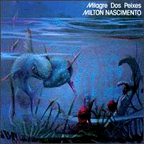 Milton Nascimento "Milagre Dos Peixes" (EMI Odeon, 1973)
Milton Nascimento "Milagre Dos Peixes" (EMI Odeon, 1973)


(Produced by Milton Miranda & Lindolfo Gaya)
This album has some interesting sounds and musical explorations, but it meanders endlessly, with vocalizations and repeated riffs which drive the listener to distraction... me, at least. Many tracks start off engaging, and then become noodly and static -- backing Nascimento on this album is the band Som Imaginario, which included keyboardist Wagner Tiso and guitarist Toninho Horta... A nice space-out album, but in the end, not my cup of tea. One of his better albums, though, and definitely worth checking out.
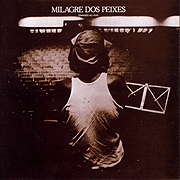 Milton Nascimento "Milagre Dos Peixes: Gravado Ao Vivo" (EMI, 1974)
Milton Nascimento "Milagre Dos Peixes: Gravado Ao Vivo" (EMI, 1974)

(Produced by Milton Miranda & Lindolfo Gaya)
Passionate and ponderous, this live performances from May, 1974 captures Nascimento and his cohorts at the height of their powers... He is backed by a revamped lineup of the prog-psyche band Som Imaginario that includes Toninho Horta on guitar, as well as a phalanx of orchestral players under the direction of Lindolfo Gaya, Radames Gnattali and Paulo Moura... The album opens with the oceanic, interminable classical-prog of Wagner Tiso's "A Matanca Do Porco/Xa Mate," and drifts into vaguely more "pop" material. For the most part, I find this whole album torturous to listen to, though if you are a Milton Nascimento aficianado, you'll definitely want to check it out. If nothing else, it gives a clear picture of the precision and clarity that Milton and his crew could summon in their live shows. It's on a par with his Clube Da Esquina albums, and doesn't fall into any of the easy formulae of his later albums. Definitely worth checking out. Also, the set list does not follow the Milagre Dos Peixes studio album, a lot of other material is included here, including intriguing covers of songs by Carlos Lyra and Tito Madi.
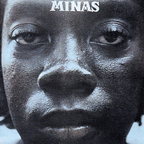 Milton Nascimento "Minas" (EMI Odeon, 1975)
Milton Nascimento "Minas" (EMI Odeon, 1975)

The first of two albums honoring his native region (the other is 1976's Geraes)... This is heavy on the jazzy side, with folks such as Toninho Horta, Beto Guedes and Paulinho Braga clustering 'round him. Wagner Tiso plays piano, and provides an orchestra on a few tracks. This record doesn't appeal to me, but jazzheads may find it one of Nascimento's most accessible releases. It's kind of static, though, and repetitive -- in fact, there's an almost Philip Glass-y undercurrent to it... If you could just get rid of that saprano sax, things would be much, much better...
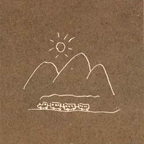 Milton Nascimento "Geraes" (EMI Odeon, 1976)
Milton Nascimento "Geraes" (EMI Odeon, 1976)

One of his best records -- it's great, as a matter of fact. This has distinctly Andean vibe to it, and indeed features a lovely duet with Chilean folksinger Violeta Parra, on her famous anthem, "Volver A Los 17." Also, a nice track with Chico Buarque, for his song, "O Que Sera" -- one of many excellent collaborations they made around this time period. This is one of Nascimento's simplest and most focused albums -- recommended!
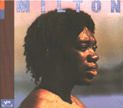 Milton Nascimento "Milton" (A&M, 1976)
Milton Nascimento "Milton" (A&M, 1976)


One of his more cohesive albums, even if it does lapse into some pretty drippy dream sequences. An all-star cast, including Airto Moreira, Herbie Hancock, Raul de Souza, and Wayne Shorter (who he later collaborated with quite extensively). This album gets silly and overblown, but it's worth checking out. Includes a nice remake of "Canelo e Cravela."
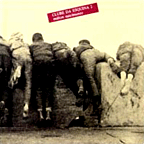 Milton Nascimento & Lo Borges "Clube Da Esquina 2" (EMI Odeon, 1978)
Milton Nascimento & Lo Borges "Clube Da Esquina 2" (EMI Odeon, 1978)

Another 2-LP set that in theory follows in the same footsteps as the first Clube Da Esquina album. However, it lacks the depth and variety of that brilliant outing. Pretty slushy and syrupy; doesn't do a lot for me, though many Milton fans swear by it.
Milton Nascimento "Travessia" (A&M, 1978)


A reissue of his first album, originally released in 1967 under the fanciful title, Milton Nascimento.
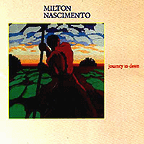 Milton Nascimento "Journey To Dawn" (A&M, 1979) (LP)
Milton Nascimento "Journey To Dawn" (A&M, 1979) (LP)

I like this album. This is actually hella fun, mostly because it's so outlandish and flagrantly "pop." Baroque, goofy, Americanized pop. At times a Herbie Hancock-ish funk riff slips in, but mostly it sounds like a collaboration between Paul McCartney, Van Dyke Parks... and Can. It's silly and it works, even when Milton sings in English... Recommended.
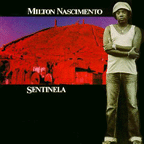 Milton Nascimento "Sentinela" (Verve, 1980)
Milton Nascimento "Sentinela" (Verve, 1980)


I like about a third of this record, if I listen to it sideways. A couple of rhythm-oriented batucada tracks, a smidge of straightforward pop-rock, and a couple of nice ethereal ballads make this a little more engaging than his usual indulgent spacey stuff. Lots of guest stars, too: Nana Caymmi and Boca Livre among others. Nascimento and Argentinian folk singer Mercedes Sosa duet on a disappointing cover of Silvio Rodriguez's otherwise wonderful "Sueno Con Serpientes." The song founders in a washed-out arrangement: instead, you should check out the haunting original version on Rodriguez's album, "Dias Y Flores".
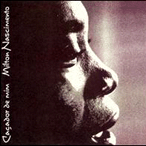 Milton Nascimento "Cacador De Mim" (BMG Ariola, 1981)
Milton Nascimento "Cacador De Mim" (BMG Ariola, 1981)


Does he really do a cover version of "Ghost Riders In The Sky"?? Why, shore 'nuff, pardner... complete with a lavish, ridiculous string arrangement courtesy of his old sidekick, Wagner Tiso. It's kinda funny. OK pop music; at least he starts things off with his sense of humor intact... But inevitably (on Side Two) this album becomes horribly goopy and a little embarrassing.
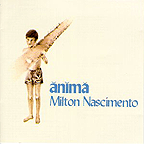 Milton Nascimento "Anima" (Verve, 1982)
Milton Nascimento "Anima" (Verve, 1982)

Has its moments, but basically half "yeesh," half "sure, okay...whatever." Bad rock guitar and overwrought arrangements mar several tracks, though others are fine. Guest appearances by Caetano Veloso and Simone are unimpressive, though a brief verse by chanteuse Elis Regina -- just before her tragic death by overdose -- is somewhat eerie and striking.
 Milton Nascimento "Quilombo" (Verve, 1982)
Milton Nascimento "Quilombo" (Verve, 1982)


An afrofcentric, liberation theology/neo-Catholic mass, written in memory of Brazil's legendary quilombos (settlements which were founded by escaped slaves). Nascimento provided the score and organized a performance in the town of Recife. As far as production values go, this is one of Nascimento's more focussed albums, but it's also musically rather static, mainly dominated by a quasi-churchy chorus, fronting a band of Afro-Brazilian percussionists led by Robertinho Silva. It's quirky and interesting for a while, but overall rather dreary.
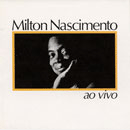 Milton Nascimento "Ao Vivo" (Barclay, 1983)
Milton Nascimento "Ao Vivo" (Barclay, 1983)


Nascimento gets a pretty big sound out of his live band... though when you've got 39 other musicians playing behind you, that isn't so hard to accomplish. Under the direction of Wagner Tiso, this is a pretty florid affair -- scary Latin pop at its most bombastic, with an almost Broadway-ish feel at times. Robertinho Silva holds down the rhythm section; Gal Costa guests on one track, but unimpressively.
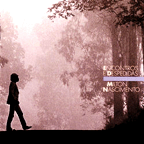 Milton Nascimento "Encontros E Despedidas" (Polydor, 1985)
Milton Nascimento "Encontros E Despedidas" (Polydor, 1985)

More scary pop with the usual pals helping out -- Pat Metheny, etc. Don't ask, don't tell. Famed cellist-arranger Jacques Morelenbaum helped sculpt the sound (but we won't hold it against him...)
Milton Nascimento "A Barca Dos Amantes" (Verve, 1986)

A super-slick collaboration with jazz saxophonist Wayne Shorter. Nascimento's interest in Luso-Africanism is still at the fore, with a song about an 18th Century quilombo ("Louvacao A Mariama"), along with plenty of more romantic material. Probably too glossy for many of us, still, this is a rather focused effort.
Milton Nascimento "Yauarate" (Columbia, 1987)

It's no wonder Nascimento shies away from making straight pop albums, when he gets stuck making ones as awful as this. Synths, bad electronic drums, production values that were terrible when first done in 1983 and '84 -- and SAPPY arrangements galore, courtesy of Quincy Jones, Wagner Tiso, Dave Grusin and the like. Eminently avoidable.
Milton Nascimento "Miltons" (Columbia, 1989)

One of his more consistent and diverse albums. The first half is pretty strong, then it gets into some iffy territory. But this has a more conventional "pop" structure to it than many other Nascimento albums. Worth checking out.
Milton Nascimento "Txai" (Columbia, 1990)

Nascimento's homage to the music of the rainforest. Mostly pretty sappy -- Kenny G style lite-jazz arrangements predominate, and the tracks with traditional or folkloric percussion and chants aren't enough to offset the cheese factor. The native music isn't that compelling: you could easily find better presentations of similar material elsewhere.
Milton Nascimento "O Planeta Blue Na Estrada Do Sol" (Columbia, 1992)

Live performance.
Milton Nascimento "Angelus" (Warner Brothers, 1994)

Plenty of Milton's trademark falsetto ululations, framed by predictably lite fusion-pop. Several big name guest stars, including jazzcats Herbie Hancock, Pat Metheny, Wayne Shorter (and others) as well as Peter Gabriel, James Taylor, etc. Some interesting arrangements, but nothing that he hadn't done before. Most pretty cheesy.
Milton Nascimento "Amigo" (Warner Brothers, 1995)


Oy vey. An unreasonably florid, schmaltzy live album. Milton accompanied by a sometimes-Coplandesque orchestra, trying out some of his cheesiest arrangements yet. The tympanis work doubletime on this one. True fans may love this; I did not.
Milton Nascimento "Nascimento" (Warner Brothers, 1997)


Soft-jazz/pop oriented production. A couple of livelier percussion-based numbers, but mostly pretty slushy. Could be worse. (See above).
Milton Nascimento "Tambores De Minas" (Warner Brothers, 1997)

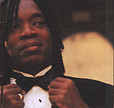 Milton Nascimento "Crooner" (Warner, 1999)
Milton Nascimento "Crooner" (Warner, 1999)


This starts off with great promise, but quickly devolves into a typically super-cheesy Nascimento outing. For decades, Milton has been identified with "out there" vocals -- open-ended ululations, drifting, spacy folk-jazz scat singing and spacy, loose-ended arrangements, but although there are several standards on here, including a run-through of "In The Mood" on a hidden "mystery track" at the end of the CD), this isn't really the grrovy pop vocals album the title implies. Most of these tracks are of Latin American origin, including Brazilian oldies such as Jorge Ben's "Mas Que Nada" and the Jobim/Moraes bossa nova tune, "Lamento No Morro". The album's payoff really depends on your point of view: I suspect that there may be too much of a soprano sax-laden, Michael Bolton-y feel to this to appeal to many of us. However, this album has a few less-cringeful highlights, including the opening track, a Brazilianified version of an oldie by Nilo Menendez, along with "Reposta", a primarily acoustic ballad by Samuel Rosa which stands out for its gracefulness and economy. On the other hand, an English-language version of Michael Jackson's "Beat It" is played for laughs, and Milton's cover of the soul oldie "Ooh Child" doesn't work nearly as well as one might hope. A mixed bag, mostly overproduced and overblown.
Milton Nascimento & Daniel Barenboim "Brazilian Rhapsody" (Teldec, 2000)

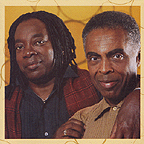 Milton Nascimento & Gilberto Gil "Gil & Milton" (Warner, 2000)
Milton Nascimento & Gilberto Gil "Gil & Milton" (Warner, 2000)


During the dark years of Gilberto Gil's artistic nadir, he frequently got a creative jolt by working with other artists -- his live album with Caetano Veloso is a great example. Now that he's back on a roll, it seems Gilberto is returning the favor with this understated MPB-superstar collaboration. It's not nearly as groovy as Gil's latest albums, but it's much better and more listenable than the bulk of Nascimento's work. Fairly straightforward and cohesive pop, with ballads and bossas galore... it would appear that Gil has helped anchor Nascimento, much in the way his pals did for him back in the '80s. The album includes a surprisingly nice reggae cover of George Harrison's "Something", and an unfortunate butchering of Jorge Ben's funk classic, "Xica Da Silva"... but on the whole, this is a pretty solid album. Towards the end, Gilberto's renewed interest in forro comes to the fore, and these are some of the album's best tunes. Not stellar, but worth checking out.
Milton Nascimento "Pieta" (Warner, 2002)


Milton Nascimento "Maria Maria/Ultimo Trem" (Far Out, 2005)


Previously unreleased sessions of music composed for two Brazilian ballets, originally recorded in 1976 ("Maria Maria") and 1981 ("Ultimo Trem").
Best-Ofs
Milton Nascimento "Amigo E Coisa Pra Se Guardar..." (Universal, 1998)
This 10-Cd box set includes straight reissues of Courage, Milton, Journey To Dawn, Sentinela, Cacador De Mim, Missa Dos Quilombos, Anima, Ao Vivo, Encontros E Despedidas, and A Barca Dos Amantes. Chew on that for a while!
Milton Nascimento "A Arte De Milton Nascimento" (PolyGram, 1990)


Reissued on CD in 2004, this gathers material from various '80s albums. I say mean things about most of them in my reviews of Milton's individual records, but I will say this for this particular collection: it's certainly easier to listen to than the original albums, and gives a pretty good picture of what Milton was up to at the time. It's mostly pretty drekky, but if you really wanna check him out, this 20-song set is as good a collection of his work from this time period as you're likely to find.
Milton Nascimento "14 Grandes Sucessos De Milton Nascimento" (EMI Odeon, 1985)
A fine retrospective which spans his EMI years from 1969-1976. Lots of his poppier, more melodic, guitar-oriented material.
Milton Nascimento "O Talento De Milton Nascimento" (EMI Odeon, 1985)
A 2-LP best-of which spans his EMI years from 1969-1978. Very similar to the 14 Grandes Sucesos LP, though this includes tracks from the second Clube De Esquina album, and fills in more of the middle years. The LP version, with 24 tracks, is a pretty hefty dose of early Milton.
Milton Nascimento "Nos Bailes Da Vida" (Globo, 2000)

This might actually be a "regular album", rather than a retrospective, but it seems to be drawn from various efforts over the years. All things considered, this is actually one of Nascimento's better albums. Sure, there are plenty of moments of irritating, syrupy excess, but also some of his better pop work that I've heard, including a couple of nice duets with Rita Lee and Chico Buarque. I can't say as this stuff really does it for me, but if you wanted to check out Nascimento's more recent work, this would be a pretty favorable -- and representative -- sampling.
Milton Nascimento "Serie Sem Limite" (Universal, 2001)

Tributes
Flora Purim "...Sings Milton Nascimento" (Narada, 2001)


Zimbo Trio "...Interpreta Milton Nascimento" (Ovacao, 1980)


Ricardo Silveira & Luiz Avellar "Live: Play The Music Of Milton Nascimento" (Adventure Music, 2004)


Related Records
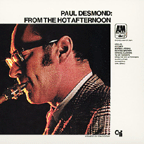 Paul Desmond "From The Hot Afternoon" (Verve, 1969)
Paul Desmond "From The Hot Afternoon" (Verve, 1969)


As an architect of the West Coast "cool" style, saxophonist Paul Desmond certainly could lay claim to a big piece of the Braz-jazz puzzle. Sadly, though, this album where he tries to do just that is not one of his career high points, with orchestrations that range from overly-baroque to flat out icky... it doesn't even rate an actual comment in the All Music Guide, other than a two-star rating. Still, this does feature some of the earliest jazz recordings of Milton Nascimento's work... the rest of the album is devoted to songs composed by Edu Lobo, who was Wanda De Sa's husband for over a decade. This album didn't do much for me, but many folks consider it a classic.
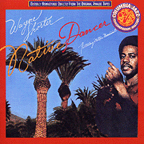 Wayne Shorter "Native Dancer" (Columbia, 1975)
Wayne Shorter "Native Dancer" (Columbia, 1975)


A fairly solid commercial jazz album, from the height of the fusion days, this is the first of many collaborations between soprano sax player Shorter and the dreamy-spacy Milton Nascimento. This album had a profound impact on the '70s jazz scene, introducing a more modern, non-bossa nova Brazilian sound into the experimentation of the time. Milton performs on and contributes several songs, and although Shorter takes some interesting chances with Nascimento's material (particularly on the melodically-deflated version of "Lilia"), ultimately he seems to have lacked the compositional strength that would have made this a truly great album. As it is, it's a little goopy, and many of the songs lack true resonance.



Main Brazil Index

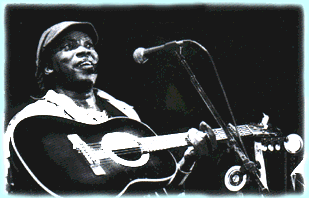 Milton Nascimento is one of those acquired tastes, like -- I dunno -- Equal sweetener, or Marmite. Personally, I don't get it. He simply does not appeal to me, for reasons given in excruciating detail below... Naturally, I am forced to recognize that, despite my foolish delusions of having something called "good taste," I must be one thousand percent wrong about Nascimento, because he is widely hailed as a musical genius, and four trillion Brazilians can't be mistaken about something like that... can they?
Milton Nascimento is one of those acquired tastes, like -- I dunno -- Equal sweetener, or Marmite. Personally, I don't get it. He simply does not appeal to me, for reasons given in excruciating detail below... Naturally, I am forced to recognize that, despite my foolish delusions of having something called "good taste," I must be one thousand percent wrong about Nascimento, because he is widely hailed as a musical genius, and four trillion Brazilians can't be mistaken about something like that... can they?



























